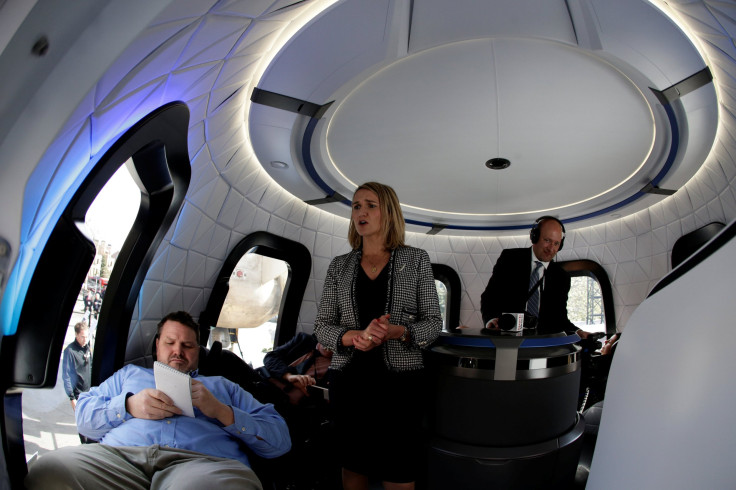Blue Origin Update: Jeff Bezos Is Selling Amazon Stock To Fund Rocket Company

A billion dollars of Amazon stock is being sold annually to fund the Blue Origin rocket company, Amazon CEO Jeff Bezos told the 33rd U.S. Space Symposium in Colorado Springs, Colorado, Wednesday.
Bezos, who is worth $75 billion, said he expects to spend $2.5 billion to develop a rocket that can lift satellites – and eventually people – into orbit. Eleven-minute rides for space tourists are planned to start next year, he said, with an eye toward making the company a profitable long-term business though ticket sales have yet to begin.
“My business model right now for Blue Origin is that I sell about $1 billion a year of Amazon stock and I use it to invest in Blue Origin,” he said. “It’s very important that Blue Origin stand on its own feet and be a profitable, sustainable enterprise. That’s how real progress gets made.”
Read: Asteroids Are Flying Past Earth More Often Than Usual
Virgin Galactic is selling space tourism tickets for $250,000, which includes three days of training and a 2 1/2 hour flight, while NASA got a deal from SpaceX for flights to the moon, $74.7 million for five astronauts. Russian space tourist Dennis Tito bought a ticket aboard a Russian Soyuz spacecraft in 2001 for a reported $20 million.
Bezos told reporters he wants to make space travel as common as airline flights, hoping to bring the cost down by 99 percent with the use of reusable rockets, the Colorado Springs, Colorado, Gazette reported.
Read: Boeing Unveils Concept Images For Cislunar Habitat, Deep Space Transport Vehicle
"My singular focus is to have people in space. To make that model work, we have to do other things, so satellite customers will cover some of the costs in the early innings," Bezos said. "The demand for this will be up to the customers. I have thrown plenty of parties that no one came to, but I don't think that will be case."
Unlike Elon Musk’s SpaceX, which plans to go to Mars, Blue Origin will focus on sub-orbital flights, Bezos said. He said his space tourists will need only an hour of training before flight.
"I want to see an entrepreneurial explosion in space," he said. "Most things you now do in space have a high cost of admission. If we can reduce the cost of launch by a factor of 10 or 100, it will be a completely new world -- a golden age of space exploration."
Blue Origin had been planning to start testing crewed flights this year, but that probably won’t happen, SpaceNews reported.
“We’re going to go through the test program, and we’ll put humans on it when we’re happy,” he said. “I don’t think it’s going to be 2017 at this point. It could be.”
Bezos said there’s no rigid schedule for development of the New Shepard propulsion system, and he’s constantly reminding his team they’re not involved in a race.
“This vehicle is going to carry humans. We’re going to make it as safe as we can make it,” he said. “We’re not going to take any shortcuts. We’re going to put humans on this vehicle when we’re ready and not a second sooner.”
The New Shepard crew capsule was on display at the symposium. It has six seats in a horizontal position, large windows and computer monitors. Passengers will be able to float around the cabin for about 4 minutes during a typical flight.
Adding a second stage would allow the rocket to put small satellites into orbit although the company’s New Glenn vehicle is the more likely candidate for such duty, Bezos said.
© Copyright IBTimes 2024. All rights reserved.






















